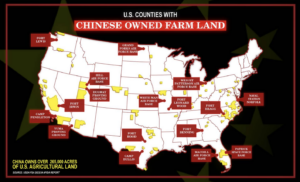New plan to include ban on farmland purchases for ‘foreign adversaries’
The USDA will no longer allow Chinese nationals or other “foreign adversaries” to purchase farmland in the U.S. as part of the National Farm Security Action Plan announced July 8.
Agriculture Secretary Brooke Rollins framed the initiative as a defense measure, saying “farm security is national security.” USDA said the “historic plan” “elevates American agriculture as a key element of our nation’s national security, addressing urgent threats from foreign adversaries and strengthening the resilience of our nation’s food and agricultural systems.”
Federal data shows that Chinese investors own about .03% of America’s farmland, or about 265,000 acres. Concerns, however, persist about the land’s proximity to military installations.
 Rollins, joined by Defense Secretary Pete Hegseth, Attorney General Pam Bondi and Homeland Security Secretary Kristi Noem, unveiled the National Farm Security Action Plan’s seven strategic pillars, designed to shield farmland, strengthen supply chains and protect American producers.
Rollins, joined by Defense Secretary Pete Hegseth, Attorney General Pam Bondi and Homeland Security Secretary Kristi Noem, unveiled the National Farm Security Action Plan’s seven strategic pillars, designed to shield farmland, strengthen supply chains and protect American producers.
“The first of the seven is securing and protecting American farmland ownership, actively engaging at every level of government to take swift legislative and executive action to ban the purchase of American farmland by Chinese nationals and other foreign adversaries,” Rollins said the July 8 news briefing.
Rollins also confirmed the USDA will seek to reclaim previously purchased farmland, saying efforts “involve using presidential authorities to reclaim farmland in the U.S. that is now owned by foreign adversaries.”
Rollins underscored the USDA’s progress to date: contracts with “entities in foreign countries of concern” were already canceled, and hundreds of foreign-linked businesses have been removed from USDA programs, she said, describing the actions as part of the broader crackdown.
Describing the move as “aggressive action,” USDA outlined the National Farm Security Action Plan’s seven key focus areas:
- Secure and protect American farmland by addressing foreign ownership “head on,” ensuring full transparency and tougher penalties.
- Enhance agricultural supply chain resilience by refocusing domestic investment and identifying non-adversarial partners for key inputs.
- Protect the U.S. nutrition safety net from fraud, abuse and foreign adversaries by ensuring that funds across USDA’s nutrition programs, such as SNAP, are preserved for U.S. citizens in need.
- Defend agricultural research and innovation from foreign influence, intellectual property theft, forced technology transfers and agroterrorism threats.
- Put America first in every USDA program, from farm loans to food safety.
- Safeguard plant and animal health by cracking down on bio-threats before they reach U.S. soil.
- Protect critical infrastructure, with farms, food systems and supply chains treated as national security assets.
The plan has gained bipartisan support from Congress and in at least 26 states that already restrict foreign farmland ownership. USDA is preparing new regulations and pushing for an executive order to fully implement the action plan.
In October 2023, Arkansas gave global seeds producer Syngenta two years to sell 160 acres of farmland it owns in the state because the company is Chinese-owned.
A massive budget bill signed into law July 4 extends 2017 tax breaks in part by cuts to health care and nutrition programs, like SNAP and Medicaid. To keep the national deficit within legal limits, social safety net programs including SNAP would be slashed by more than $1 trillion over the next decade, according to Congressional Budget Office estimates.










